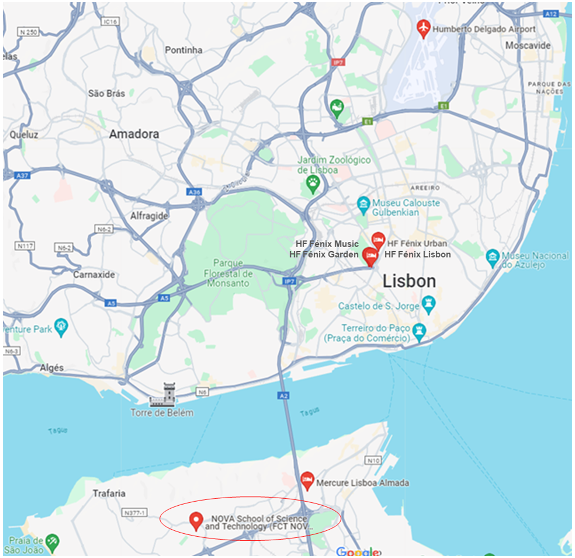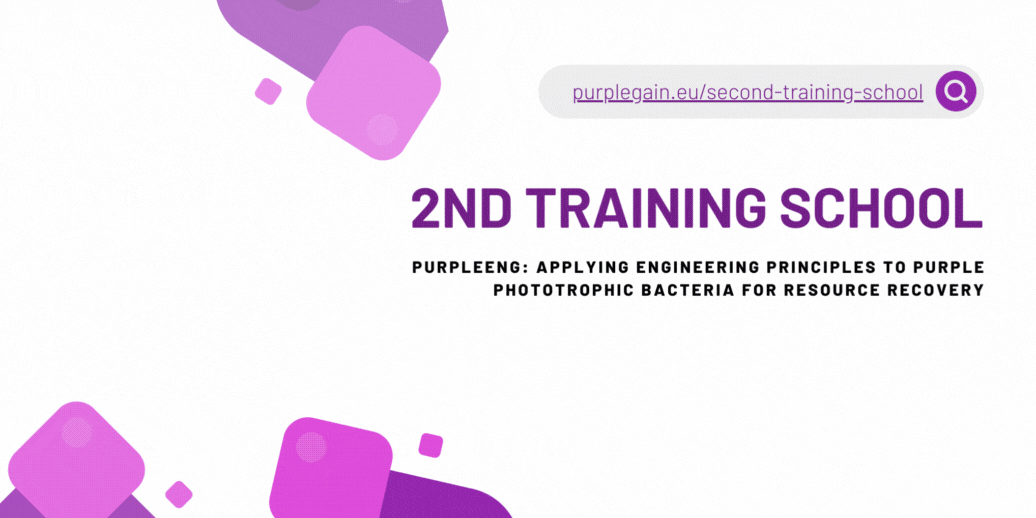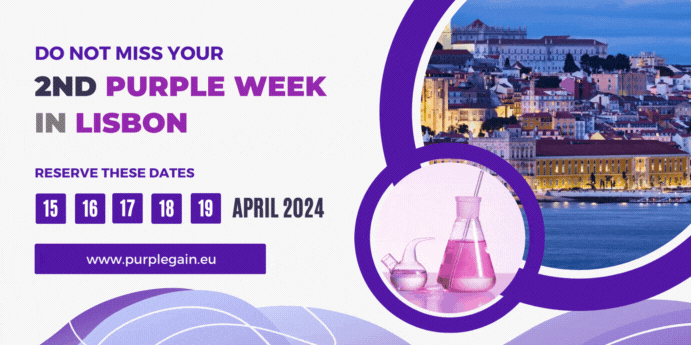Second Training School
PurpleEng: applying engineering principles to Purple Phototrophic Bacteria for resource recovery
15-17 April 2024
Lisbon – Portugal
COST Action
COST Action CA21146
COST Action CA21146 is a four-year networking action that aims at creating a European network to share information, facilitating technology and knowledge transfer between the academic and industrial sectors, related to Purple Photosynthetic Bacteria (PPB) applications for resource recovery from organic waste sources. Resource recovery includes wastewater or organic waste, open or closed environments, in single or chain processes.
The network associates fundamental-focused and applied research groups, improving lab-scale technology optimization through mechanistic modeling. It benefits the technology transfer from applied-research groups to industry, considerably improving process design. PURPLEGAIN also aims to create a database for techno-economic, social and environmental impacts studies, which facilitates the marketability of both the PPB-based technologies and the products to extract. Some focused products are polyhydroxyalkanoates, single-cell proteins, biomass for energy, biomass as fertilizer, biohydrogen, carotenoids, terpenoids, organic acids, coenzyme Q10, and 5-aminolevulinic acid.
COST
COST is an intergovernmental framework for European Cooperation in Science and Technology established to initiate networking and coordination of nationally funded research activities on a European level. It facilitates bringing good scientists together under light strategic guidance based on networks, called COST Actions, centred around research projects in fields that are of interest to COST countries and cooperating countries.
PurpleEng: applying engineering principles to Purple Phototrophic Bacteria for resource recovery
Presentation
The Training school is organized by Dr. Joana Fradinho (Vice Chair and head of the local organizing committee), Dr. Daniel Puyol (Chair), Dr. Gabriel Capson Tojo (Working Group 2 Leader), Dr. Luis Diaz Allegue, WG2 co-Leader, Dr. Raul Muñoz Torre – Grant Awarding Coordinator, Dr. Ioanna Vasiliadou (Training Schools Coordinator), in the frame of WG 2: Resource recovery from waste and wastewater and downstream procedures for PPB biomass of the COST action (CA21146) – PURPLEGAIN.
- Celebration dates: 15-17th April 2024, Lisbon, Portugal
- Organizing committee: Dr. Joana Fradinho (Vice Chair and head of the local organizing committee), Dr. Daniel Puyol (Chair), Dr. Gabriel Capson Tojo (Working Group 2 Leader), Dr. Luis Diaz Allegue, WG2 co-Leader, Dr. Raul Muñoz Torre – Grant Awarding Coordinator, Dr. Ioanna Vasiliadou (Training Schools Coordinator).
- Key dates:
- Final date to apply for funding: 8th March 2024.
- Communication, confirmation and funding (if applicable in the form of reimbursement): 4th March 2024.
- Early bird registration: 31st March 2024.
- Location: The Second Training School will take place in the Agora Room, in the Library Building (days 15th and 16th April) and Auditorio Manuel Laranjeira, Building One, at NOVA School of Science and Technology.
PURPLEGAIN aims to create a European network to share information, facilitating technology and knowledge transfer between the academic and industrial sectors, related to PPB applications for resource recovery from organic waste sources. Resource recovery includes wastewater or organic waste, open or closed environments, in single or chain processes. The network associates fundamental-focused and applied-research groups, improving lab-scale technology optimization through mechanistic modelling. It benefits the technology transfer from applied-research groups to industry, considerably improving process design. PURPLEGAIN also aims to create a database for techno-economic, social and environmental impacts studies, which facilitates the marketability of the PPB-based technologies and the products to extract. Some focused products are polyhydroxyalkanoates, single-cell proteins, biomass for energy, biomass as fertilizer, biohydrogen, carotenoids, terpenoids, organic acids, coenzyme Q10, and 5-aminolevulinic acid.
In this three-day Training School will impart experts from a diverse portfolio of disciplines from all over Europe, under the frame of the Cost Action CA21146 – Fundamentals and applications of purple bacteria biotechnology for resource recovery from waste (PURPLEGAIN).
Venue
The PurpleWeek will take place at NOVA School of Science and Technology (FCT NOVA). As seen in the map, the venue is located on the south side of Tagus River, with Lisbon located on the north side of the river. The airport and some recommended hotels are also highlighted.

Within the NOVA School of Science and Technology campus, the training school event will take place at the Agora Room, in the Library Building (days 15th and 16th April) and Auditorio Manuel Laranjeira, Building One (see map below).

Schedule
1st day|Purple Bio-refinery
Time | Title | Trainer |
| 8:30–9:00 | Registration | |
| 8:45–9:00 | Presentation of training school activities | Dr. Joana Fradinho. Chemistry Department, NOVA School of Science and Technology |
| 9:00–10:00 | Introduction to phototrophic systems | Dr. Joana Fradinho. Chemistry Department, NOVA School of Science and Technology |
| 10:00–11:15 | Hydrogen production using PPB | Dr. Harun KOKU. Associate Professor, Department of Chemical Engineering, Middle East Technical University |
| 11:15–11:45 | Coffee Break | |
| 11:45–13:00 | How to integrate Purple Phototrophic Bacteria in a biorefinery process? | Dr. Helene Carrere. INRAE, Univ Montpellier, LBE, France |
| 13:00 – 14:30 | Lunch | |
| 14:30–17:30 | Project preparation by students | Dr. Luis Diaz Allegue, Department of Bioscience Engineering, University of Antwerpen Instructors: Helene Carrere, Daniel Puyol, Luis Diaz Allegue, Ioanna Vasiliadou, Joanna Fradinho, Siegfried Vlaemink |
2nd day|Economy and industrialization biorefineries
Time | Title | Trainer |
| 9:00 – 11:00 | Techno Economic assessment. The case of Protein production | Dr. Siegfried Vlaemink, Associate Professor, Department of Bioscience |
| 11:00 – 11:30 | Coffee Break | |
| 11:30 – 13:00 | Improving the scale-up and sustainability of microalgae production in commercial-scale facilities | Dr. Lais Speranza, Sustainability Group Leader of the GreenCoLab (R&D institution on micro and macroalgae) |
| 13:00 – 14:30 | Lunch Break | |
| 14:30 – 18:00 | Presentation of Projects by students | Instructors: Helene Carrere, Daniel Puyol, Luis Diaz Allegue, Ioanna Vasiliadou, Joanna Fradinho, Siegfried Vlaemink |
3rd day|SuperPro Designer Workshop
Time | Title | Trainer |
| 9:00 – 11:00 | SuperPro Designer presentation | Demetri Petrides. President at Intelligen, Inc. USA |
| 11:00 – 11:30 | Coffee Break | |
| 11:30 – 13:00 | Computer practicum | Demetri Petrides. President at Intelligen, Inc. USA |
| 13:00 – 14:30 | Lunch Break | |
| 14:30 – 17:30 | Computer practicum | Demetri Petrides. President at Intelligen, Inc. USA |
Accommodation and Transportation information
Room rates
1. Room rates of Mercure Lisboa Almada Hotel (Located on the South side of Tagus River)
| Appellation | Room rates in EUR/room/night |
| Single room | EUR 80 (VAT included) |
| Single room with breakfast | EUR 90 (VAT included) |
| Double room with breakfast | EUR 100 (VAT included) |
2. Room rates for HF Hotels: HF Fénix Lisboa / HF Fénix Urban / HF Fénix Garden / HF Fénix Music (Located in Lisbon city center)
PurpleWeek has an agreement with HF Hotels with a dedicated website link where you can choose among 4 HF hotels and make your reservation with discount prices for the event (prices are per room). Note that the prices are not fixed and may change until the celebration date of the event.
Link: https://purpleweek24.hfhotels.com/corporate/
About the price
In order to make reservations please send an email to ha040-re@accor.com. In the email please indicate the code PWEEK-FCT to have access to the mentioned prices.
Payment method
Reservations can be paid in advance through bank transfer (up to 3 days before arrival) or locally at the hotel. Once you make the reservation via email, the Hotel will provide you the details to make the bank transfer.
Parking
There is on-site free covered car parking
Penalty-free cancellation deadline
- Penalty-free cancellation deadline: participants can cancel their reservation up until a week before upon arrival without penalty.
- Penalty: After the deadline, the price will be charged in full.
Transportation information
Transports at Humberto Delgado Airport, Lisbon
Humberto Delgado Airport, Lisbon is the nearest airport and there is a variety of transportation options to ensure smooth connectivity to and from the airport.
- Taxi Services and Ride-Sharing Apps: located outside the terminals.
- Public Transportation: Lisbon Airport is well-integrated into the city’s public transportation network.
- Metro: The red line (linha vermelha) of the Lisbon Metro serves the airport and provides a quick and cost-effective way to reach different parts of Lisbon. Passengers can access the metro station from Terminal 1.
- Buses: Various bus routes operate from the airport, serving different areas within Lisbon and its surroundings. Passengers can find bus stops conveniently located outside both Terminal 1 and Terminal 2.
Transports at the venue, Nova School of Science and Technology (FCT NOVA)
When considering your options be aware that Nova School of Science and Technology (FCT NOVA) is not located in the city center of Lisbon but on the south side of the Tagus River. Nevertheless, the campus is easily accessible through several public transportation.
- Taxi or Ride-Sharing: Taxi and ride-sharing services are readily available in the area. You can use apps like Uber or Bolt to conveniently reach the campus. It takes about 15 to 25 minutes to arrive at FCT NOVA from Lisbon (prices around 15€).* This is the recommended transportation choice for those staying in Lisbon
- Public Transportation: FCT NOVA is well-connected by public transportation. You can reach the campus by:
- Bus: Several bus lines connect the campus with different parts of Lisbon and neighbouring areas. Check the official website of the Carris Metropolitana for detailed bus routes and schedules.
- Bus (to Monte da Caparica (FCT)): https://www.carrismetropolitana.pt/planeador/
- Train: The nearest train station is Pragal. From there, you can take a bus, taxi or metro to reach FCT NOVA. Trains run frequently from Lisbon’s main stations such as Roma-Areeiro, Entrecampos, Sete Rios and Campolide.
- Train (to Pragal): https://www.fertagus.pt/pt/viajar/mapa-de-rede
- Metro (to Universidade): https://www.mts.pt/horarios/
- Bus: Several bus lines connect the campus with different parts of Lisbon and neighbouring areas. Check the official website of the Carris Metropolitana for detailed bus routes and schedules.
Transportation Guide from Mercure Lisboa Almada Hotel and HF Fénix (Lisbon) to FCT NOVA venue
1. From Mercure Lisboa Almada Hotel:
- By Public Transportation: Metro (to Universidade): https://www.mts.pt/horarios/

- Take a short walk (about 4 min.) to the Ramalha metro station, board on the metro heading to Universidade, and exit at the Universidade stop (~15 min).
- Direct buses, taxis or ride-sharing (Uber, Bolt) are also available.Bus (to Monte da Caparica (FCT)): https://www.carrismetropolitana.pt/planeador/
2. From HF Fénix:
For those staying at the HF Fénix hotels (located in Marquês de Pombal, Lisbon), the easiest and direct route to reach FCT NOVA is by using a taxi or a ride-sharing service app such as Uber or Bolt (15 to 25 min).
By public transportation:
Bus (to Monte da Caparica (FCT)): https://www.carrismetropolitana.pt/planeador/
Take a short walk to the bus stop Marquês de Pombal (P6), board on 3709 bus heading towards Costa da Caparica (Terminal) and exit at Monte da Caparica (FCT) stop, which is right in front of FCT NOVA campus.
Besides the 3709 bus, previously mentioned, other buses are heading to Monte da Caparica (FCT) stop, departing nearby the HF Félix hotels easily accessed by metro (blue line from Marques de Pombal or Parque station):
- In Sete Rios and Praça de Espanha, bus 3711 (heading to Monte da Caparica (FCT)
- In Sete Rios and Praça de Espanha, bus 3705 (heading to Charneca da Caparica (centro)
- In Praça de Espanha, bus 3710 (heading to Costa da Caparica (terminal)
Financial Support – Application procedure for reimbursement
Documentation for applying
The documentation needed for applying for reimbursement are as follows:
- Applicants must upload a short Curriculum Vitae (in English).
- Applicants must upload a motivation letter (in English).
- Applicants must upload a scanned copy of their passport (if applicants do not have a passport, they can upload their national ID card)
Selection criteria
The selection criteria for participants that will be eligible for reimbursement will comply with the COST Excellence and Inclusiveness Policy, in the implementation of the Action and will encourage attendance by a diverse selection of participants in consideration of:
- Underrepresented groups, including those with disabilities. Priority will be given to underrepresented groups, including those with disabilities.
- Gender balance.
- The level of involvement of Inclusiveness Target Countries (ITCs). Priority will be given to participants form Inclusiveness Target Countries. The current list of ITCs include Albania, Armenia, Bosnia and Herzegovina, Bulgaria, Cyprus, Czech Republic, Estonia, Croatia, Georgia, Greece, Hungary, Lithuania, Latvia, Malta, Moldova, Montenegro, Poland, Portugal, Romania, Slovenia, Slovakia, Republic of North Macedonia, Republic of Serbia, Turkey and Ukraine.
- The level of involvement of Early Career Investigators (ECIs). Priority will be given to PhD students and young post-doctoral researchers, followed by senior post-doctoral researchers and professors.
- In addition, Training School organizers may also consider other special attributes such as
- Type, or level of expertise in the field of the Workshop based on the curriculum vitae,
- Appropriate core knowledge and understanding
- Willingness to participate based on the motivation letter
- Demonstrated interest based on the motivation letter,
- The positive impact that the participants will have on the applicant’s future carrier
Financial support
Financial support through reimbursement does not necessarily cover all expenses but is a contribution to the overall travel, accommodation and meal expenses. The financial contribution includes a Daily Allowance fee (DA) and travel expenses. The DA is a fixed amount of EUR 100 per day, totalizing EUR 350 per successful applicant.
The travel expenses (distances >100km) for each successful applicant shall respect the following criteria:
- Up to a maximum of EUR 500 in total can be afforded to each successful applicant from ITC country.
- Up to a maximum of EUR 300 in total can be afforded to each successful applicant from non-ITC country.
- Up to a maximum of EUR 100 in total can be afforded to each successful applicant from Portugal.
This financial contribution must be understood as financial aid aimed to help applicants to cover the expenses of their participation in the Training School. This financial aid does not aim to cover 100% of the expenses.
Please see the General Rules to be reimbursed (https://purplegain.eu).
Evaluation process and result announcement
Evaluation process
The selection committee, composed of the Action Chair, the Vice Chair, the Grant Awarding coordinator, the Training Schools Coordinator and the WG2 Leader and co-Leader, will evaluate the applications within an 18-days period (after the application deadline) and will inform all the applicants for their evaluation results. The successful applicants will then receive an e-mail from the grant holder (Grant Letter Notification), stating the official approval of the reimbursement, the granted budget and a payment request form which has to be completed after the completion of the Training School.
Criteria of reimbursement
If the amount of reimbursement by all applications within a call does not exceed the available budget, the applications are handled by the selection committee. If there are more applications than funding is available, the following procedure takes place.
- A list of all applications (containing an informative summary) is distributed to all members of the selection committee in form of a table in which every evaluator can mark which applications he or she can evaluate according to their field of expertise.
- To guarantee a fair and objective evaluation, an evaluator should have no affiliation with neither the home nor the host institution of the application in question.
- All applications are evaluated by two members of the selection committee. The Grant Awarding coordinator distributes the proposals to the individual evaluators.
- The criteria given in the table below shall be applied for evaluation. The first criterion (a) is assessed by the Grant Awarding coordinator prior to the evaluation process.
| Criterion | max. points |
| a) Before any further criteria are considered | |
| Application is complete and fulfils all formal requirements | pass/no pass |
| The application will be ranked last if the applicant was granted in previous call | pass/no pass |
| b) Evaluation of the application | |
| Applicant from ITC country | 0 or 10 |
| Applicant is ECI (or promotes gender balance) | 0 or 10 |
| Impact on the career of the applicant | 15 |
| Willingness to participate based on the motivation letter | 10 |
| CV of the applicant | 10 |
| Relevance to the objectives of PurpleGain Action | 20 |
- The evaluators report their evaluations to the Grant Awarding coordinator.
- The Grant Awarding coordinator ranks all evaluations and then reports the final result to the selection committee to be discussed and accepted.
- The applicants are informed about the decision reached.
More information
For further information, you may contact the
- Dr. Joana Fradinho – Local Organizer, Vice-Chair
- Dr Daniel Melchor Puyol Santos – Chair
- Dr Raul Muñoz Torre – Grant Awarding Coordinator
- Dr. Gabriel Capson-Tojo – WG2 Leader
- Dr. Luis Diaz Allegue – WG2 co-Leader
- Dr. Ioanna Vasiliadou – Training Schools Coordinator




